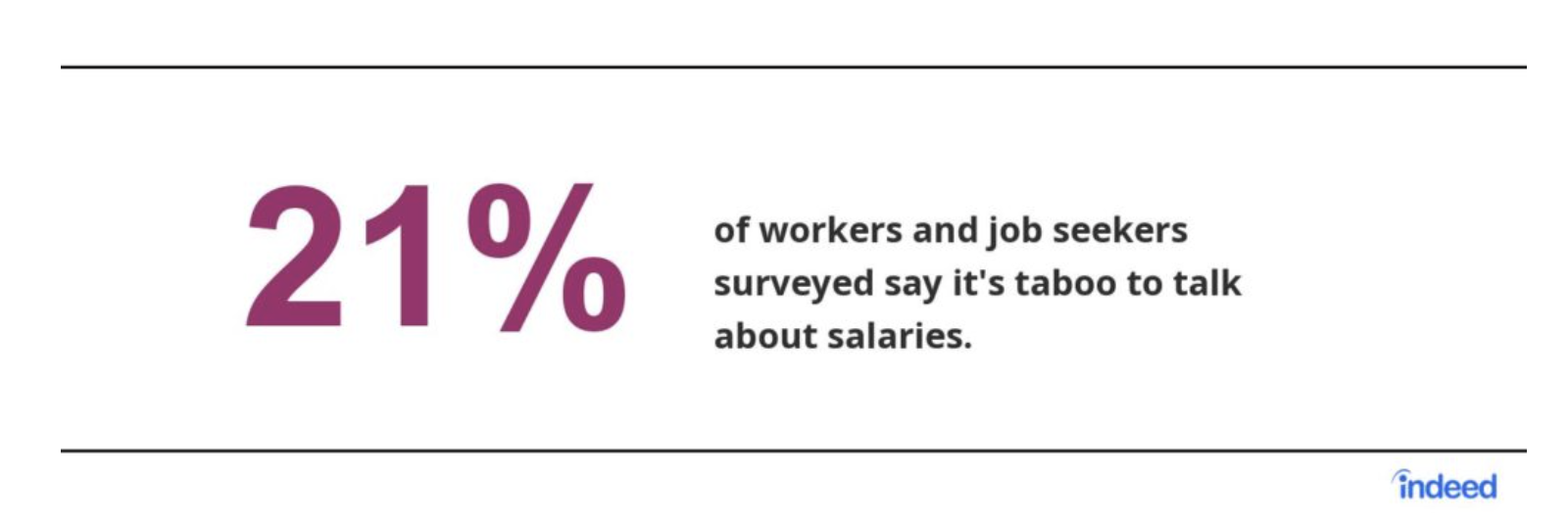
Ashley explains how an honest conversation about salary led to more equitable pay
For most of my adult life, I believed the unwritten rule that discussing pay was inappropriate and led to conflict and competition with peers. Then I learned first-hand how an honest conversation can lead to action and help fight the pay gap that has existed for too long, particularly for women and people of color.
I know what it’s like to start a job and find out the person sitting next to me is earning almost 25% more with a nearly identical resume.
There are many conflicting emotions that come with this knowledge. It’s natural to feel angry or slighted or even guilty for knowing the information. That’s often followed by confusion and internal conflict about what to do next. I chose to speak up and I’m glad I did.
Fact: Most workers don’t seek answers once they learn they weren’t being paid equitably
After several sleepless nights, I met with my manager to discuss how I came into this knowledge and how it made me feel. My decision immediately paid off. He was receptive and set the wheels in motion to adjust my salary according to my market value.

Sadly, too few people take the same leap. According to an Indeed survey from December 2020, only 23% of people who discovered a pay gap discussed it with their manager, and only 12% went to HR. What’s more telling: 66% of men who met with their managers or HR had their salaries adjusted while only 43% of women received a favorable response.
Fact: In the US, a company cannot legally forbid non-managers from discussing their salary with co-workers
I’m proud to be part of that small percentage that fought for their right to equal pay. I’m even more proud to work for a company that not only listens, but takes action to remedy pay discrepancies in its own workforce, as well as promotes the value of salary transparency to our clients around the globe.
Why is salary transparency so important?
The simple answer: salary transparency leads to pay equity. Pay equity, at its core, is about equal pay for equal work and affects every single person in the workforce, regardless of race or gender.
However, data shows the wage gap disproportionately affects women and even more so, women of color. It has been this way since women joined the workforce in mass during World War II. Since then, steps have been taken to address this, but they haven’t always been swift or effective. The first Equal Pay Act in the US was introduced to Congress in 1945. It failed to pass until 1963.
Even more alarming, studies show at the current trajectory, white women will not achieve pay equity until the year 2069. It’s even worse for women of color.
Here are a few other things that will happen in 2069.
- Britney Spears turns 88
- Indeed turns 65
- 106 years will have passed since the Equal Pay Act was signed. One hundred and six years.
How Indeed is trying to bridge the gap
For the last four years, Indeed has conducted annual pay equity studies to assess our progress and address discrepancies when they arise. Each year, an independent, outside company examines employee compensation based on factors such as demographics, work experience and responsibilities, according to SVP of Human Resources, Paul Wolfe.
While these studies don’t tell us if gender is the only factor for any pay disparity or if it is a combination of factors, these studies provide insights into where there are discrepancies so we can take action.
“We use the results to identify inconsistencies in how we are paying our employees and make any necessary adjustments,” Paul says.
In addition to completing the annual study, which provides a hindsight view, Indeed also explores tactics to get ahead of salary discrepancies, including enhanced training for compensation planners who determine merit and bonus budgets.
Paul acknowledges that we’re making progress, but there’s still work to be done until we have complete $1 for $1 parity in all areas.
Walking the walk
In 2018, Indeed CEO Chris Hyams, was asked by an employee why Indeed didn’t include salary information in our job descriptions. This set the wheels in motion to start the conversation about including salaries in our own jobs. It was a huge undertaking, and in July 2019, Indeed began publishing base salary ranges for roles up to Director level. Since then, we’ve continually worked to optimize this process.
This type of salary transparency can often lead to difficult conversations around pay equity, but it can also lead to action. Indeed has done everything they can to be prepared when tough conversations arise.
Our compensation team has taken many steps to ensure employees have the training and tools to address the issues when they arise. People managers are given training on how to handle the conversations and which steps to take if changes need to be made. Our Talent Attraction team is also given training on how to broach this topic with candidates.
We are now a leading voice spreading the word to other companies about the importance of salary transparency.
Pay up
This March, in recognition of International Women’s Day and Women’s History Month in the US, Indeed created two powerful campaigns to highlight how important women are to the workforce and how pay equity continues to be a challenge: #WorkNeedsWomen and Pay Up.
For an eye-opening social experiment highlighting pay disparities across different industries, watch this video to see how being transparent about salary can make all the difference.
Additionally, following a study on the devastating impact of COVID-19 on women in the workforce, Indeed released this video to put their stories front and center.
On March 24th, we recognize Equal Pay Day in the US for all women. In addition, there are intersectional awareness days for other under-represented populations. See the other Equal Pay Day dates below.
Asian American and Pacific Islander Women: March 9
Black Women: August 3
Native American Women: September 8
Latinas: October 2
Laura Brady, Global Brand & Communications Manager for Indeed’s Environmental, Social & Governance team explains why it’s important to give each group their own awareness day.
“Intersectionality is crucial to the fight for Equal Pay. As more companies discuss the need for equal pay for equal work, it’s important to ensure that these conversations reflect the experiences of all women. In addition to recognizing the unique barriers experienced by women of color, lgbtq+ and women with disabilities must also be centered and have a voice at the table,” she says.
I share my story because I hope it helps others understand the importance of having uncomfortable conversations about compensation. We can make big changes by taking small steps over and over. What small steps are you ready to take?
Below, you can find more helpful resources from Indeed to help you know your worth.
Salary transparency calculator
Learn more about Diversity, Inclusion & Belonging at Indeed here.



